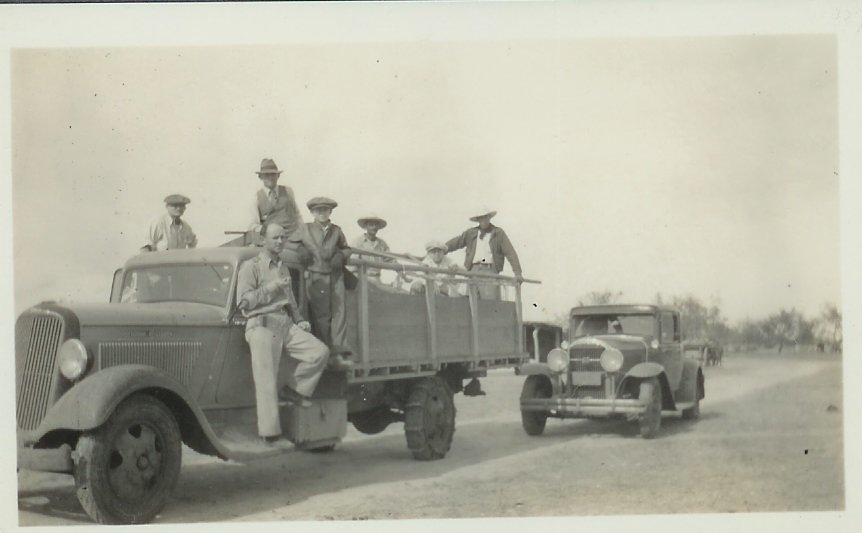
My father was a man of many talents. The greatest, in the eyes of a young boy, was his ability to convince my teachers and Mr. Rice, (elementary school principal), that my education would be better served by a trip to Mexico than by staying in the classroom. He was right of course, but I must admit that I somehow missed out on the niceties of English grammar. I still don't know much about dangling participles and imperfect preterits. Perhaps if I did I would be better equipped to set down on paper these rambling memories. On the other hand I wouldn’t have much to write about if I had stayed in school. I guess life truly is a series of trade-offs.
In the spring of nineteen thirty-six Tom worked his magic to take me on a camping trip to Los Mochis, Sinaloa. We traveled in the ranch truck, a Dodge as I remember it. The outside dual tires were removed, as the deep ruts could only handle single tires. We carried a couple of barrels of gasoline as well as all the camp gear, including an outboard motor. There were five of us -- Tom, Dad, (my grandfather), a neighbor, Mr. Bagnall, Trinidad Flores, a long-time employee at Sinaloa Ranch, and me. Of course, this meant that there were always at least two of us riding in the back of the truck. In another vehicle were Arthur McFadden and Herb Walker from Santa Ana. We got a late start and camped on the desert near the Salton Sea. We made one more camp before arriving in Nogales. Most of the day was spent there, arranging permits at immigration and having all the baggage inspected at customs. I didn’t realize it at the time, but Tom had scouted around and found someone that would take our rifles and ammunition across for us, as these were not permitted into Mexico.

Fred Bagnall
Dad Robertson, Tom Robertson, Leigh Robertson,? ? ?
After crossing the border and heading south he told me about the plan. We were to rendezvous at a certain point about thirty miles down the road. I'm sure we all wondered if we would ever see the man again, as he had been paid in advance. Much to my surprise he did show up. Everything was stowed carefully at the bottom of a huge grub box, covered by a one hundred-pound bag of potatoes. So, that was one lesson I would not have learned in school.
When we reached Magdalena, it was raining heavily. We had to cross the river to get into town. There was no bridge of course; we had run out of improved road some forty miles south of Nogales. The river by now was running pretty good and we hesitated to cross. Presently, a man came along, and said he would find a crossing for us. He took us a little farther downstream and then walked across in front of us to be sure that the water was not too deep. It never got higher than his knees, so we proceeded to cross with the vehicles.
As we drove through the Sonora desert, we saw hundreds of the largest jackrabbits I have ever seen. They are different from what we are accustomed to in California, being easily two feet high when standing erect.
In Hermosillo, Dad encountered an old friend, "Red" Morgan. During the time that Dad was in Los Mochis, he left to work with "Red" on a damn construction project nearby. It is a small world! We were now traveling through Yaqui Indian country, and Tom took precautions that were very much out of character for him. The Yaquis had been in revolt off-and-on for twenty years, maybe more. At this time there was no major conflict, only scattered incidents. Soldiers guarded the roads into and out of all the towns. We always talked to the soldiers on the way out of town, to find out if there had been any trouble reported on the next stretch of road. Also, we did not camp out in this area; we rented whatever space we could find in the towns. One town had no hotel, and the only place we could find was a storage room in back of a cantina. Needless to say, it was not the quietist place to spend the night. Sometime after midnight we heard gunshots from the cantina, then things got quiet. We left early in the morning without asking any questions. When we got to the Yaqui River we had to wait for the ferry to come to our side. While we were waiting I observed that there was very little water flowing. The ferry was floating on a large pond formed by a brush and earth damn. I asked why we didn't just drive downstream and cross the nearly dry river on our own. Tom said that since this was Yaqui country, and Yaquis operated the ferry, the prudent thing to do was to pay for the ferry. We crossed two more rivers by ferry -- the Mayo at Navojoa and the Fuerte at Los Mochis. These were sizable rivers and we got our money's worth from the ferry.
At Mochis we stayed at the ranch of Tom's uncle, Bill Bunker. We visited friends and neighbors from earlier days; Jordans, Korphages, Drakes, among others. Tom showed me the house where I was born. Strange -- there was no commemorative plaque or any thing else to mark the occasion of this momentous event. Just an oversight, I'm sure. After a few days in Mochis we packed up and drove down to San Ignacio Lagoon. Our family had had a camp there where we escaped the oppressive heat of summer when we lived in Mochis There had been a cabin, a pier, and a thirty foot boat that Dad had built. Only the cabin remained. It was just a large square room, with walls about three feet high, then open to the roof. It was all made from native materials. Posts and beams were cut from nearby trees, the walls were of ocotillo canes, and the roof tulle thatched.
When we arrived at the shore we had a choice of crossing a tidal mud flat or going about ten miles around to the other side. Since there had not been any recent rains or extra high tides, we decided to cross the flat. About two hours later, after endless digging and carrying brush and rocks from the higher ground we reached the other side, having traveled less than a half mile. We proceeded first to the Indian village of Carrizo (SP?). There, Tom found his long-time hunting companion, Lino. We also found a small boat that Dad had built some years before in California. It was built especially for a trip down the Colorado River by Dad and Grampa Utt. It had airtight metal compartments under all three seats. I know that they had some wild adventures on that trip, but unfortunately, by the time I became curious about it there was no one left alive to tell me just where they started the journey. I don't know if they came through the Grand Canyon or not.
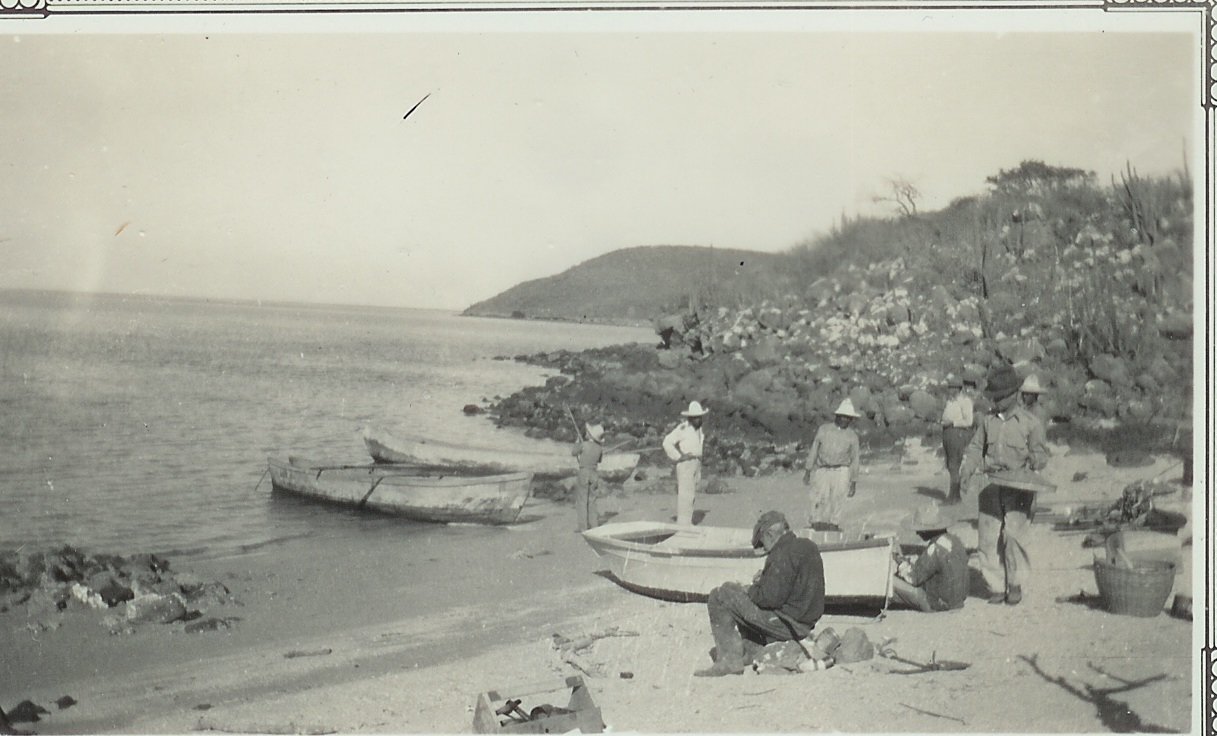
Leigh R, ?, Dad R., Lino, Mr. Mac.(White shirt), Tom R.(black hat)
The white boat is the one Dad built for the Colorado River trip
Tom arranged for two large dugout canoes to use along with Dad's little boat for our hunting and fishing expedition. Lino and several other Indians came with us. Uncle Bill and my cousin, Henry Bunker had joined us, so we were quite a group by now. When traveling by boat we put the outboard on one canoe and towed the other canoe and the boat. We made quite a parade.
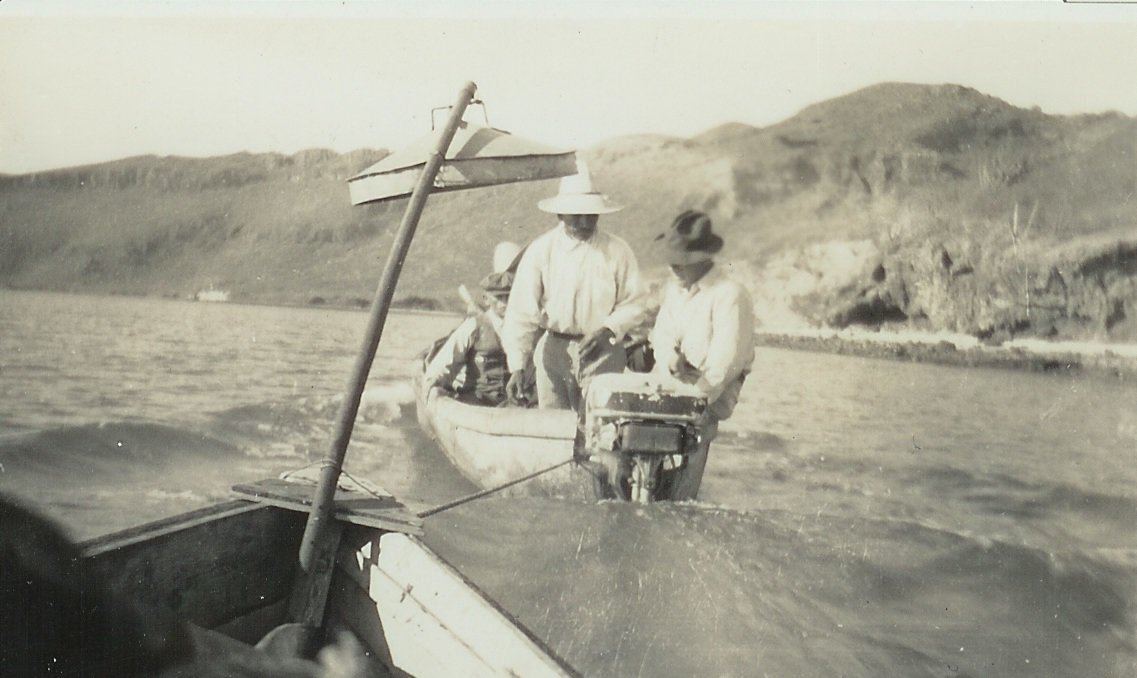
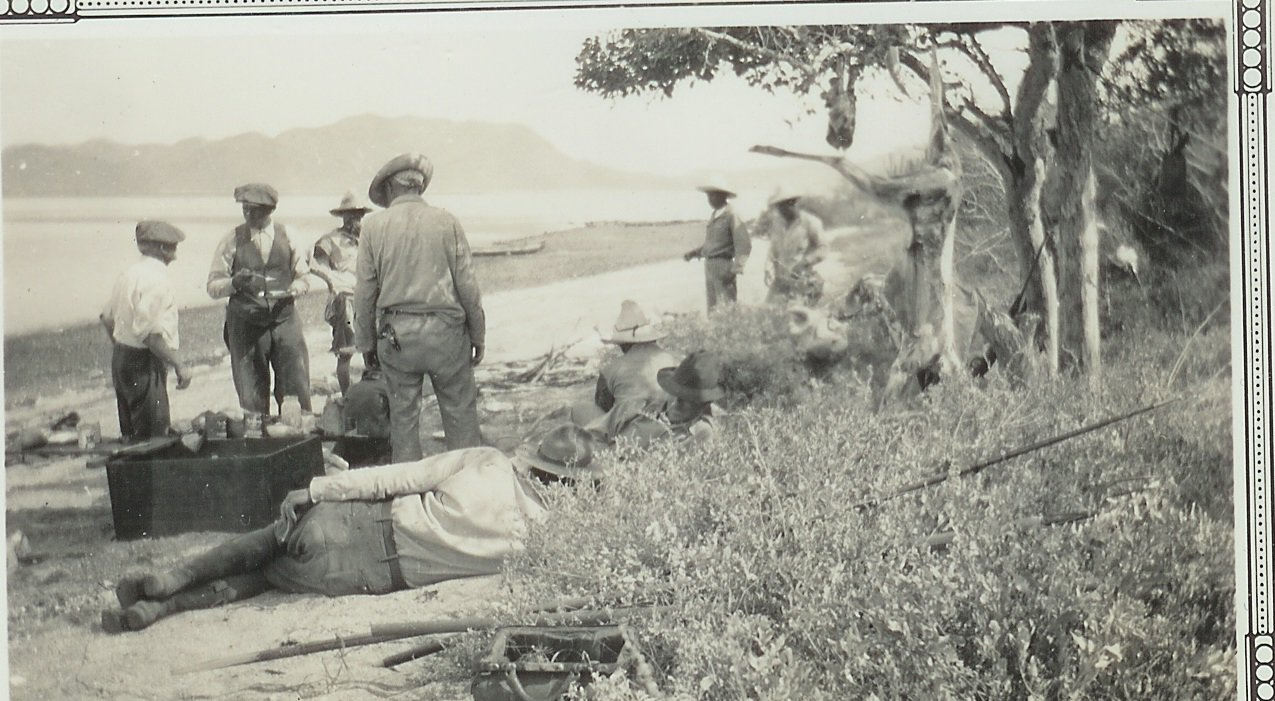
Dad, Mr. Bagnall,?, Uncle Bill Bunker, Mr. Mac
San Ignacio is a large bay sheltered from the sea by the long, low island of San Ignacio. We called it the shell island. At this writing, at least four generations of Robertsons have gathered shells on San Ignacio Island There are many small islands in the bay, along with narrow peninsulas and estuaries. Most of the shore is lined with the mangrove trees (mangle). This tree grows with its trunk and roots in the salt water. In many places there are large clusters of oysters on the tree trunks. So you see, oysters really do grow on trees! There were deer on the islands. They would swim out from the mainland, staying as long as there was feed. The method of hunting was to drop the Indians on one end of an island, then take the boats to the other end. We then spread out to various vantage points to watch for the deer. The Indians would move across the island, shouting and throwing stones, hopefully driving the deer in our direction. This may not seem very sporting, and in retrospect not very effective, considering the number of beaters and hunters. In several days of hunting we only bagged two deer. One of these was my first buck. Tom and I had climbed up into a couple of small trees where we could watch a wide flat separating a large hill from the mainland. We expected any deer coming off the hill to cross to the mainland. When this buck emerged he chose instead to run along the edge of the brush, directly toward us. Tom fired once and missed, and by the time I got organized he was only about thirty feet away. He fell instantly, almost at my feet. It was a great thrill at the time, but not something I would do today.
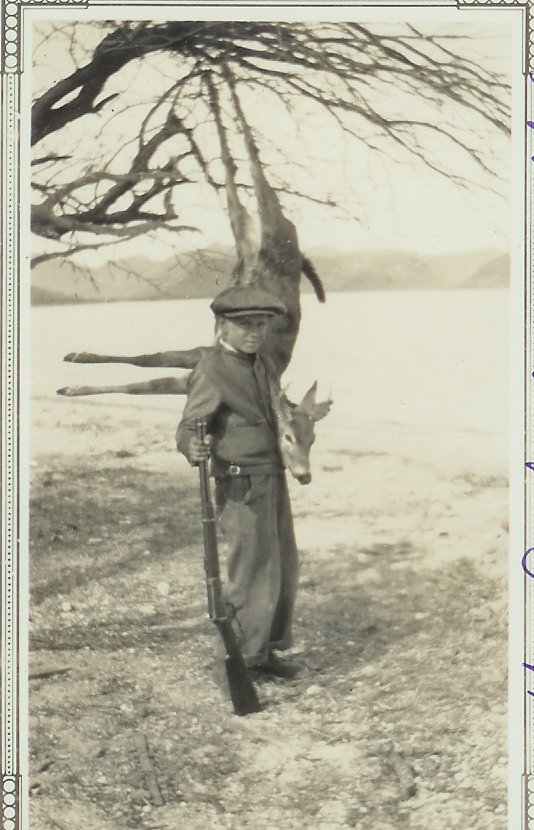
Leigh and his first buck
We moved our base camp two or three times. One such camp was at La Bolita, so named because of a round hill at the end of a point of land. One day Tom and some of the others went off hunting and returned with five peccary or wild pigs. They were quite tasty barbecued on the evening fire. That same day, while I was fishing from the rocks, I heard what sounded like a woman, screaming in great distress. When I asked Tom about it he said it was a mountain lion and suggested I not wander too far from camp by myself. I have heard that cry a number of times since and it is still eerie. It makes you want to rush out and rescue the person in distress. Strangely enough, even though I've heard lions in many remote areas, even here in Mariposa, the only one I've ever seen in the wild was while sitting at a picnic table in Griffith Park in the middle of Los Angeles! I was watching the hillside when a large lion strolled casually across a clearing about two hundred yards away.
Sometimes at night we would go out to spear fish. Tom fastened a Coleman lantern on a pole about four feet in front of the boat. He used a large tin dishpan as a reflector, to keep the light out of our eyes as we stood in the front of the boat. He had me put my spear in the water at the approximate angle that I would be throwing it. The pole appeared to bend upward at the water line. He explained that the light bends as it passes from water to air or air to water. Therefore any target would appear to be higher than it actually was, and I would have to compensate by aiming below the fish. How many of my sixth grade classmates do you suppose learned this enormously important application of this scientific fact? Evenings were spent around the fire. Of course Dad never went anywhere without his accordion, so there was much music. He would play and sing songs that only he knew. Then there were songs in both English and Spanish that others joined in. After the music stopped and most of us were in bed, Uncle Bill would still be telling stories to the Indians. He surely was one of the world's greatest storytellers. He had led a very colorful life and also had a great imagination. Sometimes the stories, punctuated by gales of laughter, went on for hours.
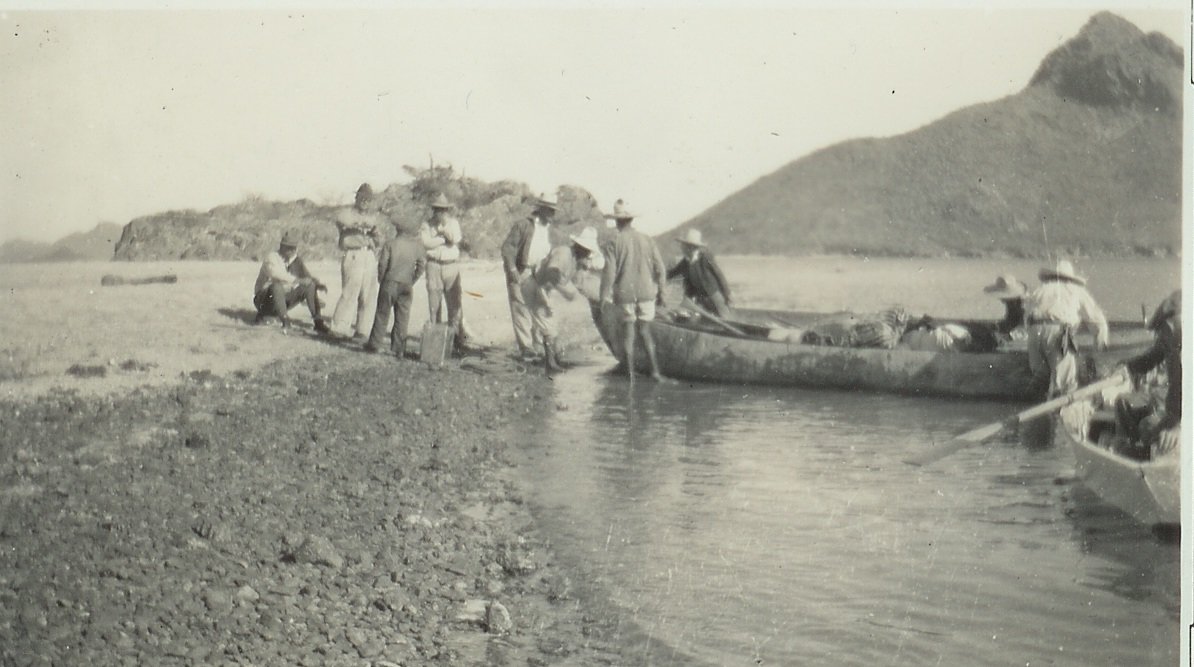
Loading our gear in the boats
We returned to Los Mochis for a couple of days, then started home. Henry Bunker made the return trip with us so that he could live on the ranch and go to high school in Simi. Over the years there were a number of boys from Mochis that went to high school in Simi. Every night in camp on the trip home Henry would carefully lay out a horsehair rope in a circle around his bedroll. When I asked why, he told me that rattlesnakes would not cross the rope. I don't know if there is anything to that, but at least none did cross it in the several nights that we slept out on the desert. Once when we were stopped at midday a cowboy rode into camp. He had some lunch with us, and Tom admired the rawhide rope tied to his saddle. The man told of how long he had spent cutting strips of hide and braiding them into a rope. He even demonstrated how well it handled by roping a bush. When asked if he would sell it, he was very reluctant, not knowing how he could get along without it while making another. After much friendly conversation he did agree to sell it to us for four Pesos. The exchange was two to one at the time, so I had a beautiful "riata" or lariat in English, for two dollars, U.S. The cowboy probably rode home and called to his wife, "Maria, get another rope from the storeroom. I just unloaded my old one on some Norte Americano!" I arrived home tired and dirty, but much, much wiser! Also, my riata made me the envy of all my "horsy" friends.
Return to the Short Stories and Trips Page